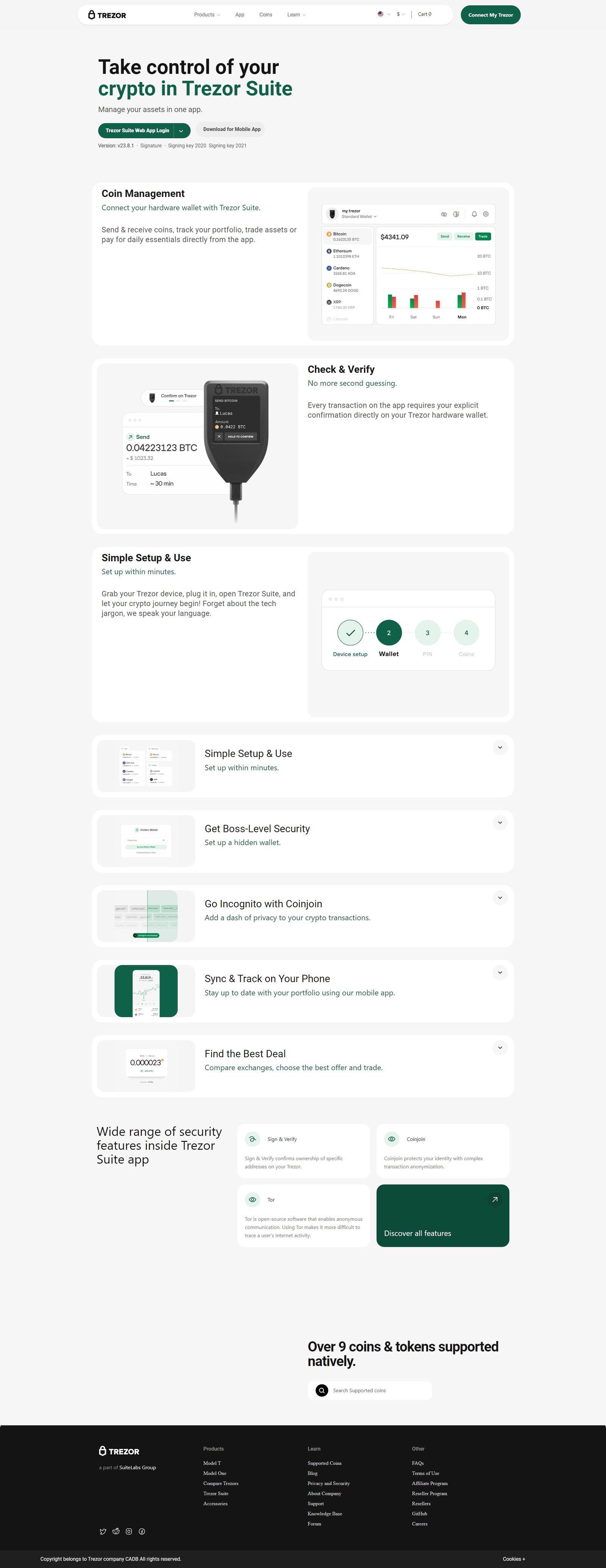
Trezor .io/start 🚀
Are you ready to take full control of your cryptocurrency? Visiting Trezor.io/start is your gateway to a secure, user-friendly setup of your Trezor hardware wallet. In this blog you’ll learn how to get started, explore key features, dive into technological underpinnings, answer common FAQs, and wrap it all up with a conclusion.
Why Visit Trezor .io/start?
When you go to Trezor.io/start, you are directed to the official setup guide for the Trezor hardware wallet (via the official site) — enabling you to download the companion application, initiate your device, and secure your assets. Trezor+1 It’s the first step toward self-custody of your crypto.
Getting Started: Step by Step Guide
1️⃣ Download the Trezor Suite: On the Trezor.io/start page you’ll be prompted to download the official app (desktop or web) to manage your wallet. Trezor+1
2️⃣ Install and connect your device: Plug in your Trezor hardware wallet, follow the prompts, ensure firmware authenticity, set up PIN, and write down your recovery seed. Trezor+1
3️⃣ Enable coins and manage your account: Within the Trezor Suite app you can enable supported cryptocurrencies, add accounts, send/receive, swap, stake, monitor portfolio. Trezor+1
4️⃣ Move your crypto and go live: Once setup is complete, you can transfer assets from exchanges or hot wallets to your hardware wallet and enjoy enhanced security. Trezor
🌟 This process typically takes around 15 minutes for first-time users. Trezor
Key Features & Benefits of Trezor
Here are some standout features and benefits you get by using a Trezor device via the Trezor.io/start setup.
🔐 Security & Self-Custody
Your private keys are stored offline on the hardware wallet, reducing exposure to hacks and online threats. Trezor+1
PIN protection, passphrase option, and device wipe after repeated failed attempts make it robust. Trezor
Open-source firmware and transparent design by Trezor enhance trust and auditability. Trezor Blog+1
🧰 Versatile Management via Trezor Suite
Manage multiple wallets and devices; check balances, receive/send, buy/sell, swap all in one interface. Trezor+1
Portfolio tracker mode: monitor addresses even without connecting the hardware. Trezor
Support for staking, DeFi, NFTs, and many coins/tokens. Trezor+1
✅ Ease of Use & Future-Proofing
Streamlined setup via Trezor.io/start makes onboarding simple, even for beginners. Trezor
Models with advanced features (secure element, wireless charging, etc.) ensure long-term relevance. Trezor+1
Backup/restore recovery seed ensures you retain access if device is lost. Trezor
Guide to the Underlying Technology
To truly understand the strength of Trezor, here’s a breakdown of its core technology:
Public & Private Keys: These cryptographic pairs are fundamental. The public key acts like an address to receive funds; the private key gives control and must be kept secret. Trezor
Cold Storage Hardware Wallet: By keeping private keys offline, risk associated with hot wallets is significantly reduced. Trezor+1
Firmware and Secure Element: At the hardware level, Trezor uses dedicated components to ensure authenticity, firmware integrity, and tamper resistance. Trezor
Open-Source Software & Standards: Trezor devices support standards like BIP39, BIP44, SLIP39 and expose code for community audit. Trezor Blog+1
FAQs (Frequently Asked Questions)
Q1: Do I really need a hardware wallet if I already use an exchange?
A: Yes — when your assets are on an exchange, you don’t control the private keys. A hardware wallet gives you full ownership and greatly reduces risk. Trezor
Q2: What happens if I lose my Trezor device?
A: As long as you kept your recovery seed (the written-down words during setup), you can restore access to your funds onto a new device. Trezor+1
Q3: Can I use Trezor with DeFi, NFTs, and staking?
A: Yes — through Trezor Suite and compatible apps, you can stake coins (e.g., Ethereum, Solana), interact with DeFi and manage NFTs. Trezor+1
Q4: Is it hard to set up via Trezor.io/start?
A: Not at all — the official page guides you step-by-step; for most users setup takes about 15 minutes. Trezor
Conclusion
If you’re looking to secure your cryptocurrency with confidence, going to Trezor .io/start is the perfect first step. You’ll get a guided, efficient setup of a market-leading hardware wallet that gives you true self-custody, robust security, and long-term flexibility. With features spanning offline key storage, open-source auditing, and full crypto-asset management (including staking and DeFi), Trezor stands out in the landscape of crypto wallets. Don’t wait — take control now, set up properly, and give your assets the protection they deserve. 🔐✨
Trezor.io/start — Get Started with Your Trezor Device